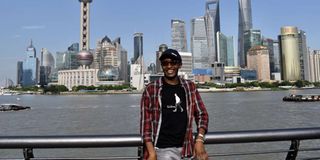Premium
Ondiek: How I am coping with Covid-19 pandemic in China

Kenyan student Andrew Ondiek.
What you need to know:
- Temperature checks before and after leaving a building were and are still a must-do.
- Gatherings are more restricted and technology has come in handy to keep track and monitor the pandemic situation.
I flew out to China in September 2019 to study and was excited that I would have a chance to experience more advanced forms of technology.
I soon embarked on intense training in the Chinese language. While at it, I was yearning for the upcoming winter holiday at the end of my first semester.
It would have been a lifetime opportunity to explore the beauty of Shanghai. I made a list of the places I would visit at the beginning of January 2020 till the end of the holiday in mid-February.
On the eve of the Chinese New Year, most streets were unusually quiet. It was at around this time that news of a deadly flu started making rounds on social media. Several grocery stores were closed. The usually busy and packed metro system was deserted. Everyone was leaving the hustle and bustle of the city to have a well-deserved vacation.
Wear a mask
Initially, I had no idea what it was. The only substantial information that I had was that I am required to wear a mask and wash my hands regularly.
By January 20, masks were a rare commodity in China. The several rounds I made to the pharmacy to get masks proved futile. Online shops were closed for the New Year celebrations, leaving me with virtually no way to get a mask. On January 23, a lockdown was imposed on Wuhan, the epicenter of the Covid-19 outbreak in an effort to stem the pandemic.
Subsequently, we received instructions not to leave the school campus and masks were distributed. As news of the coronavirus spread, it brought with it more fear and uncertainty. People were leaving China in droves.
My family was particularly worried and plans were in place to evacuate me from the country as fast as possible if the situation got worse.
Every day, I would make several calls to my parents informing them of what I was going through. As the days went by, the situation got worse.
People were being infected in the thousands and deaths were in the hundreds.
Reading news from the media platforms was terrifying. The street below my apartment was empty with no signs of life.
Covid-19 patient
The only disruption that broke the silence once in a while was the sound of an ambulance siren down the street.
The siren would trigger anxiety that maybe it was a Covid-19 patient being rushed to the hospital.
For three months, I stayed in profound fear and anxiety. Rarely did I leave my room and when I did, I used the stairs and avoided the lift just to make sure anywhere I was there was good air circulation.
Wearing masks became the norm. Temperature checks before and after leaving a building were and are still a must-do.
Gatherings are more restricted and technology has come in handy to keep track and monitor the pandemic situation.
The magnitude of change brought by this pandemic is enormous and far-reaching. I am feeling safe in China more than before but still have to take the laid down precautions because I do not know when the contagion may strike again.
Are you aged 10-20 and would like to be Nation’s young reporter? Email your 400-600-word article to [email protected]




